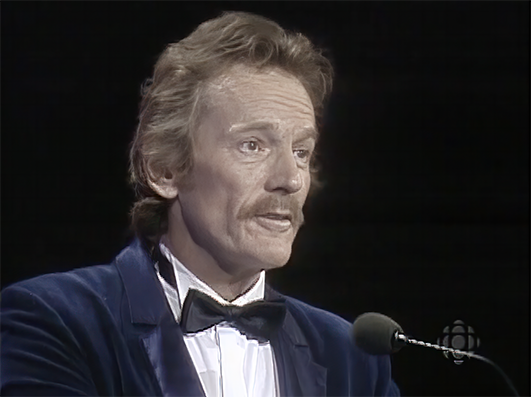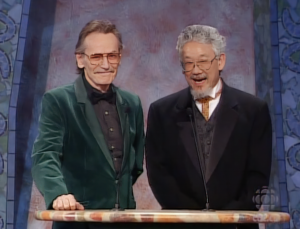To many, Gordon Lightfoot is the embodiment of Canadian music. Coming into prominence during a time when the music industry in Canada was in its infancy, Lightfoot has led the way for multiple generations of listeners and aspiring artists. His songs, which are deeply connected to his Canadian roots, have touched the hearts of millions worldwide and have helped define the very essence and sound of folk music across the decades.
Born in Orillia, Lightfoot showed an early interest in music. His talents were supported by his parents who encouraged him to perform on local radio shows and in the community’s Church choir. By the age of 13, Lightfoot had already made his debut performance at Massey Hall, taking home first prize in a Kiwanis Festival Competition. Little did he know that he would play this iconic Toronto venue many times throughout his lifetime.
Wanting to pursue a career in songwriting, Lightfoot moved to Los Angeles to study orchestration and musical theory at the Westlake School of Modern Music. However, after a few years of living in California, he returned to Canada determined to make a name for himself in his home country.

Gordon Lightfoot presents Country Male Vocalist of the Year to Murray McLachlan at The 1989 JUNO Awards.
By 1965, Lightfoot had earned a reputation as a gifted songwriter, performing his music at coffee houses and bars across Ontario, Quebec, and the Eastern United States. During one of his performances in Toronto, Canadian Music Hall of Fame Inductees Ian & Sylvia discovered Lightfoot’s songwriting abilities and helped introduce his music to a wider audience with their renditions of “Early Morning” and “For Lovin’ Me.”
At the instigation of Ian & Sylvia, Lightfoot began singing and songwriting under the management of legendary American manager Albert Grossman who represented prominent American folk musicians such as Bob Dylan. Soon, Lightfoot had a pivotal role in the burgeoning folk music scene of Toronto’s legendary Yorkville area alongside up-and-coming Canadian icons Joni Mitchell, Buffy Sainte-Marie, and Neil Young.

Gordon Light performing “If You Could Read My Mind” at The 1996 JUNO Awards.
In 1966, Lightfoot released his debut album, Lightfoot! It was an instant success earning him a spot on the Canadian charts and attracting the attention of the music industry. The following year, CBC enlisted Lightfoot to write a song to commemorate Canada’s Centennial.
The result was Lightfoot’s majestic track “Canadian Railroad Trilogy,” which is an ode to the development of the trans-Canada Canadian Pacific Railway in the 1880s. One of Lightfoot’s many quintessential songs, the epic is hailed for its vivid portrayal of the adventure, adversity, and triumph of constructing a nation.
“So over the mountains and over the plains
Into the Muskage and into the rain
Up to St. Lawrence on the way to Gaspé
Swingin’ our hammers and drawin’ our pay”
Lightfoot’s gift for capturing the essence of Canada’s landscapes, people, and history through his lyrics is considered one of his greatest contributions to Canadian music. He expertly reflected the Canadian experience with songs like “The Wreck of the Edmund Fitzgerald” and “Canary Yellow Canoe,” which describe the tragedy of a real-life maritime disaster and the beauty of Northern Canada.

Gordon Lightfoot and David Suzuki induct Bruce Cockburn into the Canadian Music Hall of Fame in 2001.
By 1971, Lightfoot had his first international hit with the single “If You Could Read My Mind” making him one of the first Canadian musicians to achieve international success without leaving Canada. The melancholy track based on the dissolution of Lightfoot’s previous marriage reached No. 1 on the RPM Top Singles chart in Canada and No. 5 on the Billboard Hot 100 chart. In 2003, the song was inducted into the Canadian Songwriters Hall of Fame.
Over the next few years, Lightfoot continued to release albums and tour extensively, building a loyal fanbase and cementing his reputation as an international folk music star. His tenth album, Sundown was his greatest critical success yet reaching No. 1 on both the Billboard 200 chart and the RPM 100 chart in 1974. The title track reached No.1 on RPM’s National Singles chart and No. 1 on Billboard’s Hot 100 chart.
Lightfoot’s influence on Canadian music was recognized in 1986 with his induction into the Canadian Music Hall of Fame. Inducted by longtime friend and confessed admirer Bob Dylan, he aptly described Lightfoot as “somebody of rare talent.”
Throughout his storied music career, Lightfoot sold millions of albums and singles, earning numerous gold and platinum records in Canada and the U.S. With 13 JUNO Awards and 29 nominations, Lightfoot is one of the most decorated Canadian artists in JUNOS history. His songs have been covered by countless artists such as Elvis Presley, Bob Dylan, Barbra Streisand, Glen Campbell and Don Williams, among many others.
Although Lightfoot largely stopped writing new music in the early 2000s, he continued to tour and perform well into his 80s. Even with a diminished voice, Lightfoot still managed to captivate eager audiences across the country. In a fitting tribute to his enduring popularity, Lightfoot was the last artist to grace the stage at Massey Hall before it closed for renovations in 2018. When the historic venue reopened in 2021, he was the first to return.
A national treasure, Lightfoot is one of the most acclaimed and respected songwriters of the 20th century. His invaluable contributions have played a significant role in shaping the Canadian music industry as it exists today.